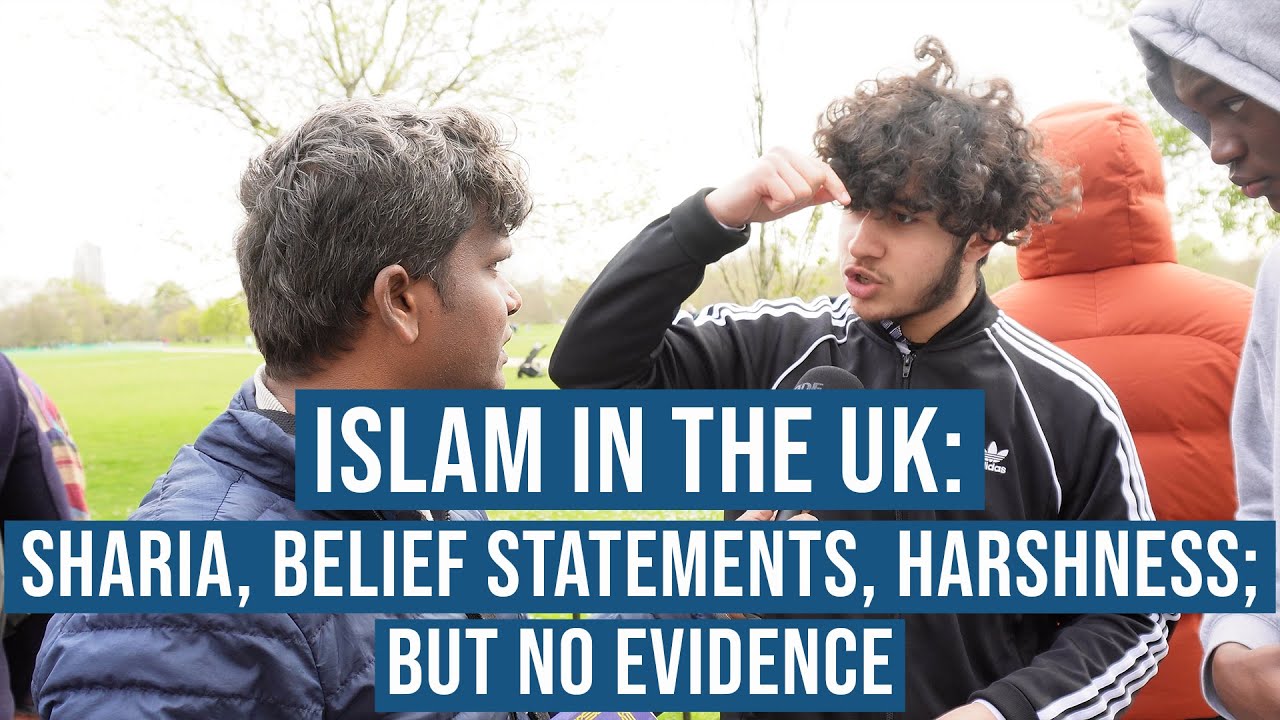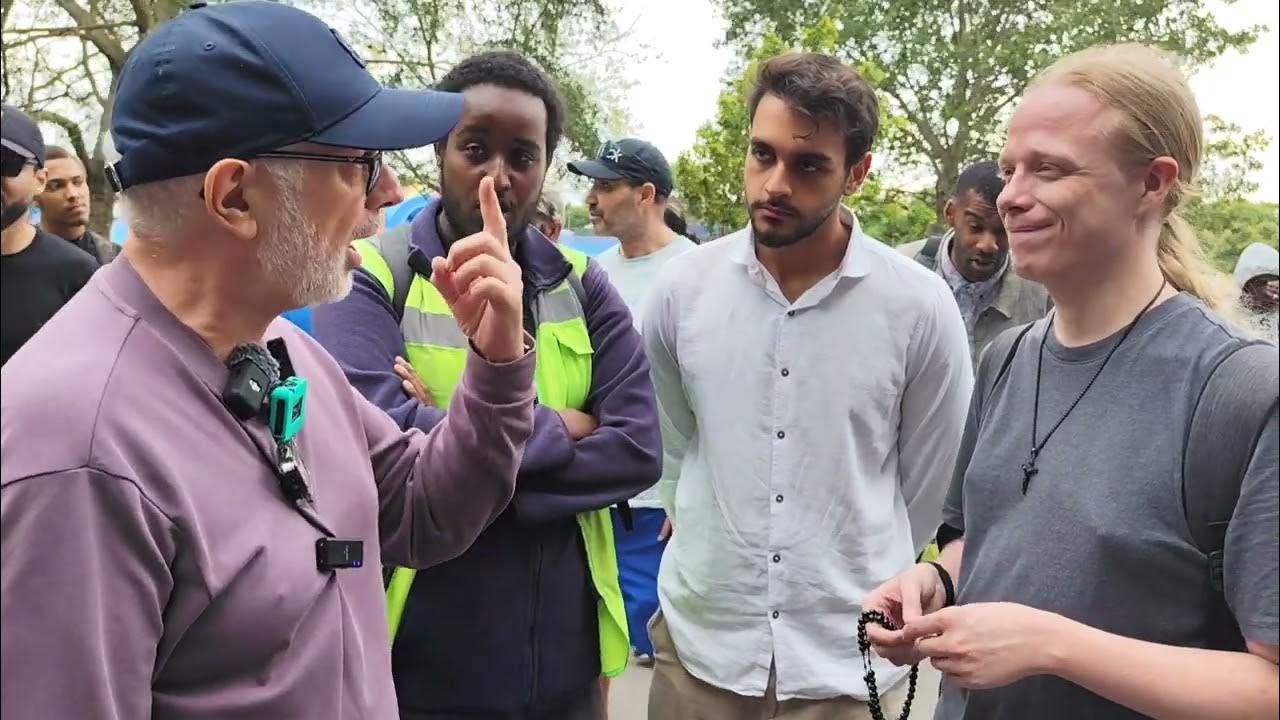Sahih BuKhari Vs The Book Of John! Mansur and Christian Speakers Corner
Summary
TLDRThe video script presents a debate between two individuals discussing the validity of religious beliefs, particularly focusing on Christianity and Islam. One participant defends the truth of Christianity by referencing archaeological evidence and writings in the Bible, while the other challenges the reliability of these sources, suggesting they reflect beliefs rather than historical facts. The debate touches on the evidence for Christ's crucifixion and death, the standards of proof in religious claims, and a comparison with Islamic evidence for the prophethood of Muhammad (PBUH). The conversation emphasizes the need for higher standards of evidence when asserting religious truths.
Takeaways
- 😀 The credibility of historical religious texts, such as the Bible, is questioned, with the argument that they may simply reflect the beliefs of their authors rather than objective truths.
- 😀 Ancient writings, like hieroglyphics, are used as an example to highlight that just because something is written does not mean it is necessarily true or verifiable.
- 😀 The importance of direct, verifiable evidence (e.g., checking a pulse) is emphasized in discussions of historical events like the crucifixion of Christ.
- 😀 There is skepticism about the idea that people in antiquity, such as first-century Jews, might not have known how to recognize death, given modern cases of mistaken death like comas.
- 😀 The discussion critiques the standards of evidence used in religious debates, arguing that blind faith or mere belief should not be considered sufficient evidence of truth.
- 😀 The conversation challenges the acceptance of certain Christian claims, asking why similar standards are not applied to Islamic claims, such as those about Prophet Muhammad's miracles.
- 😀 The need for higher standards of evidence in religious debates is stressed, highlighting that personal beliefs, rumors, and writings alone do not constitute strong evidence.
- 😀 There is a debate about whether the willingness of writers to die for their beliefs (e.g., in hieroglyphics) validates the truth of their writings, with the conclusion that it only shows they believed it to be true, not necessarily that it was true.
- 😀 The participants question the authenticity of religious claims based on the lack of tangible, medical evidence, especially regarding the death of Christ.
- 😀 The discussion touches on the importance of distinguishing between belief and historical truth, suggesting that belief in something does not equate to its objective truth.
Q & A
What is the main topic of the conversation in the transcript?
-The main topic revolves around the debate between two parties discussing the validity and authenticity of religious beliefs, focusing on the historicity of religious events, specifically the crucifixion of Jesus and the evidence for such claims.
What does one participant claim about historical texts like the Bible?
-One participant argues that historical texts, such as the Bible, contain writings that are reflective of belief but not necessarily true. They suggest that the evidence for religious events should be more substantial rather than just being a matter of faith.
What is the counterpoint made about the willingness of people to die for their beliefs?
-The counterpoint raised is that the willingness of individuals, such as those in ancient Egyptian society or early Christians, to die for their beliefs does not make those beliefs true. It only shows that the individuals believed them to be true.
How does one participant address the possibility of Jesus not actually being dead during the crucifixion?
-One participant suggests that there is a possibility that Jesus was not truly dead but merely in a coma, comparing this scenario to modern cases where people are mistakenly believed to be dead due to being unconscious or in a coma.
What role does archaeological evidence play in the argument presented in the transcript?
-Archaeological evidence is used to argue that the Bible’s historical claims are supported by physical findings. However, the opposing participant challenges the validity of these findings, claiming they are simply the beliefs of the people who wrote them and do not establish objective truth.
What is the difference in the approach to evidence between Christians and Muslims, according to the transcript?
-The Christian participant claims that evidence for religious truths is based on physical writings and historical records. Meanwhile, the Muslim participant suggests that the evidence for the prophethood of Muhammad and Islamic claims should be assessed using different standards of evidence, such as the Quran, Hadiths, and other religious sources.
How do the participants address the idea of using written texts as evidence for truth?
-The participants debate whether written texts should be accepted as objective proof of historical events. One side argues that texts like the Bible or Quran only reflect the beliefs of the authors, while the other side suggests that these texts can be valid sources of historical evidence if corroborated by other means.
What is the response to the question about whether the belief in a god of the underworld, as described in hieroglyphics, makes it true?
-The response is that while the belief in such gods in hieroglyphics may have been strongly held by those who wrote them, it does not make those beliefs true. The authenticity of the belief is acknowledged, but its truth is questioned.
What is the issue raised with the evidence of Jesus’ crucifixion?
-The issue raised is that there is no conclusive, direct evidence that Jesus was crucified and died as described in the Bible, such as someone checking his pulse or confirming his death. The claim is that much of the evidence is based on belief rather than verifiable facts.
Why does one participant suggest that standards of evidence need to be raised in religious discussions?
-The participant suggests that people should raise the standards of evidence in religious discussions because simply citing writings or beliefs does not provide objective proof of religious claims. They argue that belief alone is insufficient to establish historical truths, and people need stronger, verifiable evidence.
Outlines

Esta sección está disponible solo para usuarios con suscripción. Por favor, mejora tu plan para acceder a esta parte.
Mejorar ahoraMindmap

Esta sección está disponible solo para usuarios con suscripción. Por favor, mejora tu plan para acceder a esta parte.
Mejorar ahoraKeywords

Esta sección está disponible solo para usuarios con suscripción. Por favor, mejora tu plan para acceder a esta parte.
Mejorar ahoraHighlights

Esta sección está disponible solo para usuarios con suscripción. Por favor, mejora tu plan para acceder a esta parte.
Mejorar ahoraTranscripts

Esta sección está disponible solo para usuarios con suscripción. Por favor, mejora tu plan para acceder a esta parte.
Mejorar ahoraVer Más Videos Relacionados

P1 Christian Denies Jesus Verses! Hashim and Christian Speakers Corner

Muslims Begin with a Sharia Threat But End Up Clearing the Space When Challenged | Arul Velusamy

Gentle-Voiced Muslimah Asks 6 TOUGH Biblical Questions [Cordial & Wholesome] | @shamounian

Ai Mengungkap Kebenaran, KeKhawatiran Elon Musk Mulai Terbukti Sekarang

When I Was A Christian! Paul Williams Vs Christian Convert | Speakers Corner

You Are Done! Mansur And Jason Speakers Corner Sam Dawah
5.0 / 5 (0 votes)
